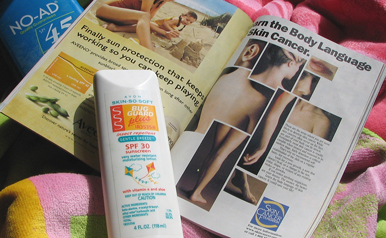BU dermatology study says sunscreen advertising doesn’t reach men
Ads lack info on how to use product correctly

Although men are far more likely than women to get — and die from — skin cancer, a new study by a BU dermatology researcher reveals that more than three-quarters of sun-protection advertisements are published in women’s magazines.
Alan Geller, a School of Medicine research associate professor of dermatology, and his team reviewed 579 magazines cover-to-cover — all summer issues of 24 different publications from 1997 to 2002 — and found that 77 percent of sun-care product ads appeared in magazines for women. On average, women’s magazines had four sun-care product ads per issue, but parent and family magazines carried fewer than one in each issue. As for outdoor-recreation magazines typically read by men, sunscreen ads averaged fewer than one in every six issues.
The study was published in the May/June issue of the American Journal of Health Promotion.
“We know that men know much less about sun protection than women,” says Geller. “There’s a huge opportunity to reach an untapped market.” Indeed, in 2002, according to numbers compiled by the American Cancer Society, more than 30,100 men developed skin cancer, compared to an estimated 23,500 women, and at least 4,700 men died from melanoma and other skin cancers, while the number of women succumbing to these diseases was about 2,700. “I’ve been doing research on melanoma for 20 years,” says Geller. “The gap between men and women is getting wider every year.”
More women than men buy sunscreen for several reasons, says Geller. For instance, women are more likely to buy the beauty products that contain sun protection. Sure enough, his team found that most ads for sun-care products were for either cosmetics or moisturizers. In addition, research shows that men engage in fewer health-promoting behaviors than women.
Geller wants to see more ads geared toward potentially higher-risk groups such as children, men, and outdoor recreation users. “For example,” he says, “you just don’t see many of these ads in boating and golf magazines.”
The advertisements should also do a better job of explaining how to properly use sun-care products, he says, noting that none of the ads his team reviewed contained the recommended guidelines for appropriate use of sunscreen: an SPF (sun protection factor) of 15 or greater and covering all parts of exposed skin with a one-ounce application every two hours. “One ounce means a palmful of sunscreen,” says Geller, adding that the SPF number is less important than “the vigilance of making sure that the skin is fully covered with sunblock.”
Geller points out that misapplication of sunscreen, such as neglecting the upper part of the neck and the ears, is unfortunately the norm. “Research has shown that many, many people use sun-protection products and still get burned,” he says. “Data show that only about 25 percent of the public knows how to use sunscreen properly.” For example, a 2002 study of sunscreen use at a beach in Galveston, Tex., found that 73 percent of the people interviewed who had applied sunscreen became sunburned. The study, conducted by the University of Texas Medical Branch in Galveston and published in the Journal of the American Academy of Dermatology, determined that a large percentage of sunburned beachgoers had gone swimming, washing off the sunscreen, or they had applied it just once all day. Most of those interviewed believed that a single application of sunscreen would work at least three hours. People who waited more than two-and-a-half hours to reapply sunscreen had five times the chance of getting sunburned, according to the authors.
Geller’s study comes two months after a class action lawsuit in Los Angeles alleging that the labels and ads of Coppertone and other brands’ sunscreen products are false and misleading, saying that the companies exaggerated the ability of their sunscreens to protect the skin against ultraviolet rays. Some labels claim “all-day protection.”
Sun-care advertising is the ideal place to educate the public about adequate coverage of sunscreen, Geller says, and it’s in the manufacturers’ best interest to satisfy their customers. “I think that if the phrase ‘reapply frequently’ were to be more prominently displayed on the label or the ad, people would use the product more properly — and they would use more of it and buy more of it,” he says.